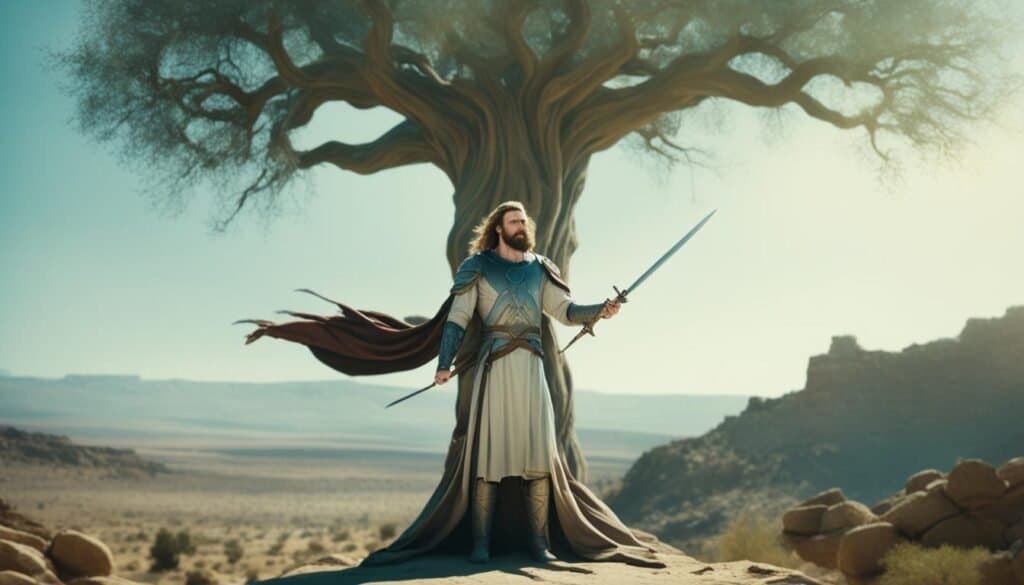Have you ever thought about how God judges fairly in the book of Genesis? We see this in the stories like when Adam and Eve faced consequences after disobeying. Also, there’s the time Sodom and Gomorrah were destroyed. These tales from Genesis show us how justice works in God’s eyes. They spark thoughts on our actions and how God’s justice and mercy interact.
Key Takeaways:
- God’s righteous judgment is seen throughout Genesis, showing consequences for wrong actions.
- Some examples include what happened to Adam and Eve, Cain’s consequence, the Flood, Babel’s language confusion, and Sodom and Gomorrah’s ruin.
- God shows His power and plans a way for change and redemption through His judgement.
- These stories make us think about our choices and their impacts under God’s fairness.
- Learning about God’s righteous judgment deepens our grasp of His love, mercy, and purity.
The Judgment on Adam and Eve (Genesis 3:14-19)
Adam and Eve gave in to temptation and ate the forbidden fruit. They had to face tough consequences. In God’s judgment, they received various curses. These curses showed how serious their actions were.
Because they disobeyed, Genesis 3:14-19 tells us what happened. Eve would feel pain when giving birth. This was a reminder of her disobedience. The earth, where Adam came from, was now cursed. It would grow thorns and thistles, making life hard. Death, the ultimate result of their sin, came into the world.
God’s judgment on Adam and Eve sets a big example for us. It shows how our choices matter a lot. And the effects of their actions still affect us today.
“And the LORD God said unto the serpent, Because thou hast done this, thou art cursed above all cattle, and above every beast of the field; upon thy belly shalt thou go, and dust shalt thou eat all the days of thy life.”
– Genesis 3:14
In His wisdom, God didn’t just punish them. He used these curses to stress the results of disobedience. The story of Adam and Eve tells us that our choices matter a lot, affecting not just us but also others later on.
Cain’s Punishment (Genesis 4:11-12)
Cain, after killing his brother Abel, faced a dire punishment. God’s judgment was swift and hard. This shows God’s deep commitment to justice, even in the face of such betrayal.
God punished Cain by making him a wanderer, never able to settle. This meant Cain would be forever alone, away from his loved ones. His guilt was a heavy load as he traveled a world forever changed by his act.
But, there was also a sign of God’s mercy in Cain’s punishment. Even after such a severe crime, God promised to protect him. Anyone trying to hurt Cain would suffer seven times more. This showed the high value God placed on Cain’s life.
This story gives us all a lesson. It shows how just God’s judgments are and why we should treasure life. It reminds us of the heavy cost of violence and our duty to act responsibly.

The Consequences of Cain’s Actions
The story of Cain teaches us a lot about sin and its effects. It shows the terrible results of jealousy, anger, and not caring for others. This story reminds us how God’s fair judgments aim to guide and protect us.
“Then Cain went away from the presence of the Lord and settled in the land of Nod, east of Eden.” – Genesis 4:16
The Flood (Genesis 6-8)
In Genesis 6-8, The Flood was a key event. It was a response to the great evil humans were committing. God decided to start over by clearing the earth. This story shows how serious human sin is and God’s firm stance on fairness.
God chose Noah, a righteous man, to save. Noah was to build an ark to rescue himself, his family, and all kinds of animals. When the rain started, it continued for forty days and nights. This flooded everything.
In the flood, the ark was a hope-filled shelter. Noah and his family’s deep faith helped them persevere. Their trust in God is a powerful example for us all to follow.
Once the flood ended, God made a promise to Noah. He swore to never flood the earth like that again. To seal this vow, He put a rainbow in the sky. It was a sign of His lasting promise.
“I have set my bow in the cloud, and it shall be a sign of the covenant between me and the earth.” – Genesis 9:13
The Flood teaches us about sin’s consequences and God’s response. It points to the importance of doing what’s right. Yet, it also shows God’s love and mercy in giving a second chance to a few. This was all to keep His plan of salvation going.
The Confusion of Tongues at Babel (Genesis 11:1-9)
Genesis tells us about the Confusion of Tongues at Babel. People decided to build a huge tower. The tower was meant to reach the sky, against God’s command to spread out and fill the earth. So, God made them speak different languages. This led to them spreading all over, not able to work together against God.

This story shows how powerful and in control God is. It’s a lesson that God values our obedience and being humble, more than our pride or independence.
When humans thought they could make a name for themselves by reaching the sky, God showed them otherwise. He stopped their plans, showing that His ways are always better than ours. Rebelling against God or putting ourselves above Him never ends well.
“Come, let us go down and confuse their language so they will not understand each other.” – Genesis 11:7 (NIV)
This story highlights the vital need for humility and obeying God. It warns us about the consequences of going against God. Reflecting on Babel, we should remember God is in charge. We should strive to live in ways that match His will. Blessings come from following God with our whole hearts.
Sodom and Gomorrah (Genesis 19)
Sodom and Gomorrah were known for being very wicked. They did evil things and God decided to punish them. He destroyed these cities with sulfur and fire. This shows how God’s judgment is fair. It warns us about the bad results of living a sinful life.
Even in this tragedy, there was a story of mercy. Lot and his daughters were saved. This shows that God is kind, even when people face bad things they have brought upon themselves. It tells us that God’s judgment can spare the ones who are faithful to Him.
The story of Sodom and Gomorrah is a strong lesson. It tells us that not following God’s morals leads to terrible outcomes. It underlines the value of a righteous and moral life.
“Then the Lord rained on Sodom and Gomorrah sulfur and fire from the Lord out of heaven.” – Genesis 19:24
Thinking about Sodom and Gomorrah teaches us important things. Living by God’s rules is crucial. While punishment might look tough, it’s God’s way of pushing for goodness and fairness in society.

| Key Lessons from Sodom and Gomorrah |
|---|
| The destructive consequences of rampant wickedness and immorality |
| God’s selective judgment and demonstration of mercy |
| The importance of upholding righteousness and following God’s moral standards |
Hagar and Ishmael (Genesis 21:9-21)
In Genesis, we find the important story of Hagar and Ishmael. It shows God’s care and protection, even during hard times.
Sarah asks Abraham to send Hagar and Ishmael away. This leads to a difficult situation. But, God intervenes and tells Hagar not to worry. He promises Ishmael will prosper, fulfilling God’s plan.
Through this story, we learn about God’s fair decisions. We also see His mercy and kindness. Even in the tough situation they face, God ensures Hagar and Ishmael are looked after.
“Do not be afraid, Hagar. God has heard the boy crying as he lies there. Lift the boy up and take him by the hand, for I will make him into a great nation.”
– Genesis 21:17-18
Giving strength to Hagar, God’s actions show His love. In hard times, His promises remain true. God does not abandon those who turn to Him for help.
The story of Hagar and Ishmael shows God’s care in the face of challenges. It highlights His protection, even during tough times.
Exploring Hagar and Ishmael’s Journey
In Genesis 21:9-21, Hagar and Ishmael’s faith is tested. They end up in the wilderness, facing an unknown future, with little food and water.
With their food gone, Hagar leaves Ishmael under a bush, in tears. She cries out for God’s help in their desperate situation.
God hears her and shows a well for water. This act saves Ishmael’s life, indicating God’s support during their trials.
Lessons from Hagar and Ishmael’s Story
Their story teaches us about God’s care in hard times. It shows:
- God listens to those in need and helps them.
- His promises are for the future of His people.
- Even in dark times, God provides a way and solutions.
Hagar and Ishmael’s tale reflects God’s mercy and justice. It reminds us there’s always hope and safety with God, even amidst judgment.
Abimelech’s Warning (Genesis 20:1-18)
Abraham and Sarah went to Gerar during their journey. Abraham was scared the people there would kill him for his wife, Sarah. He doubted God’s protection, which led to his fear.
One night, Abimelech dreamt of God telling him, “You’ll die because she’s married.” This message made him stop in fear. He realized he had Sarah, who belonged to a man God had made promises to.
When Abimelech woke, he acted quickly. He told his servants about his dream and gave Sarah back to Abraham. He was humble and sincere, admitting his mistake. Abimelech knew he shouldn’t interfere with God’s plan with Abraham.
“What have you done to us?” Abimelech asked Abraham. “How have I wronged you that you have brought such great guilt upon me and my kingdom? You have done things to me that should never be done.” – Genesis 20:9
Abimelech understood and respected God’s power. He knew breaking God’s covenant was a serious mistake. It would not only affect him but also his people.
This story shows God’s judgment protects His promises. It means God will step in if someone tries to mess with His plans or people. It’s also a lesson that shows God guides us to do what’s right, even if we make mistakes out of fear or not knowing better.

The tale of Abimelech teaches us to value and respect God’s promises. It encourages us to trust God, even when we’re unsure, and to apologize and correct our wrongs with honesty and humility. God’s judgment acts as a shield, making sure His will stays on track despite our errors.
Judgment through Famine (Genesis 12:10; 26:1)
In Genesis, famine acts as a judgment. It tests Abraham and Isaac’s faith and obedience. They face food shortages at different times.
Genesis 12:10 tells us about Abraham going to Canaan as God commanded. But, Canaan faced a severe famine. This put Abraham and his family in danger. He had to prove his faith in God. So he went to Egypt, a place with less severe famine. This choice kept his family safe and showed his deep trust in God’s support.
Isaac, in Genesis 26:1, also faces a famine. He’s told to stay in Canaan, unlike his father’s choice. Isaac’s obedience shows he trusts God’s plan, no matter what.
“And there was a famine in the land, besides the former famine that was in the days of Abraham. And Isaac went to Gerar, to Abimelech king of the Philistines.”
The Testing of Human Faith
Famine is key to testing trust in God. It shows the need to depend on God’s care and promises during hard times. For both Abraham and Isaac, challenges in foreign lands strengthened their faith. They faced problems but stayed true to God.
These stories teach us about judgment as a path for growth and reliance on God. They remind us that trust in God is vital during scarcity and unsure times. It’s our faith that helps us get through.
| Abraham (Genesis 12:10) | Isaac (Genesis 26:1) |
|---|---|
| Famine strikes the land of Canaan | Famine occurs in the land of Canaan |
| Abraham seeks refuge in Egypt | Isaac remains in the land of Canaan |
| Abraham’s faith in God’s provision is tested | Isaac demonstrates his trust and obedience to God |
Esau’s Loss of the Birthright and Blessing (Genesis 25-27)
In Genesis 25-27, we see how Esau’s actions led to him losing the birthright and blessing. It’s a story about God’s response to deceit and disrespect of His promises.
Esau was the first son of Isaac and Rebekah. He had the birthright, which meant he would inherit more and lead the family. In a moment of hunger, he gave it up to Jacob for some stew. This small act had huge consequences.
Later, when Isaac planned to bless Esau as the firstborn, Rebekah helped Jacob trick his father. Jacob, disguising as Esau, won the blessing meant for his brother.
The turn of events made Esau sad and angry. He lost the birthright and blessing because of his past choices. Jacob’s trick hurt Esau deeply.
Esau begged for a blessing from Isaac. But Jacob had already received it through deceit. Esau regretted trading his birthright for a meal.
This story shows that God’s justice is fair and redemptive. The loss of Esau’s birthright and blessing was due to his own decisions. It warns us to value what is important and make good choices.
The Consequences of Esau’s Choice
Esau’s loss affected not just him but the future generations too. It led to several key outcomes:
| Consequences | Details |
|---|---|
| Supplanting of Birthright | Jacob tricked Esau and became the rightful successor to God’s promises. |
| Anguish and Regret | Esau deeply regretted and felt bitter over his loss. |
| Separation and Rivalry | This incident caused a lasting feud between Jacob’s and Esau’s descendants. |
| God’s Sovereignty | Yet, God’s plans were still carried out through Jacob and his descendants. |
Esau’s story teaches us to honor our promises and choose wisely. It highlights that God’s justice is both right and kind. It guides history towards God’s bigger plans.
How Do Examples of Righteous Anger in Genesis Reflect God’s Righteous Judgment?
Examples of righteous anger in biblical narratives reveal God’s moral standards and the consequences of sin. In Genesis, instances like God’s fury against Sodom and Gomorrah showcase a divine response to injustice. These moments remind us of God’s righteousness, guiding humanity toward repentance and the importance of upholding justice.
Judah’s Tamar Judgment (Genesis 38)
Genesis 38 tells the story of Judah, Tamar, and a unique judgment. It’s a story of trickery, unfairness, and the chance for forgiveness. Tamar faces great sorrow after her first two marriages end with their husbands’ deaths. When Judah doesn’t give her another chance at marriage, Tamar takes matters into her own hands. She disguises herself and becomes a prostitute to be with Judah. They have twins together.
Later, when it becomes clear that Tamar is pregnant, Judah is quick to judge her. He accuses her of bad behavior and says she should be punished. But, Tamar then shows that Judah is the father. Seeing his own wrongdoing, Judah admits Tamar is right. He says she is more just than he is (Genesis 38:26).
This narrative is an important lesson on how God judges human actions. It shows that our own misdeeds can lead us to acknowledge our flaws. God’s fairness is highlighted, along with the result of how we treat others.
Genesis 38 shares a message on the importance of being fair. It warns that our actions, good or bad, have consequences. This applies to all, no matter our place in society. The story underlines the value of being humble and admitting when we’re wrong.
Reflecting on Genesis’ stories can teach us a lot. It calls for us to consider how our lives match up to God’s standards of fairness. Ultimately, we are all answerable to Him, the ultimate judge.
Affiliate Disclosure: "As an Amazon Associate I earn from qualifying purchases made from links in this post. We are a participant in the Amazon Services LLC Associates Program, an affiliate advertising program designed to provide a means for us to earn fees by linking to Amazon.com."

